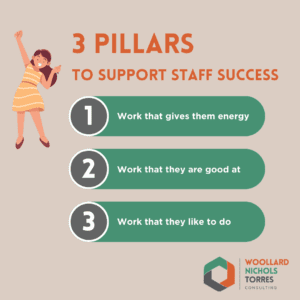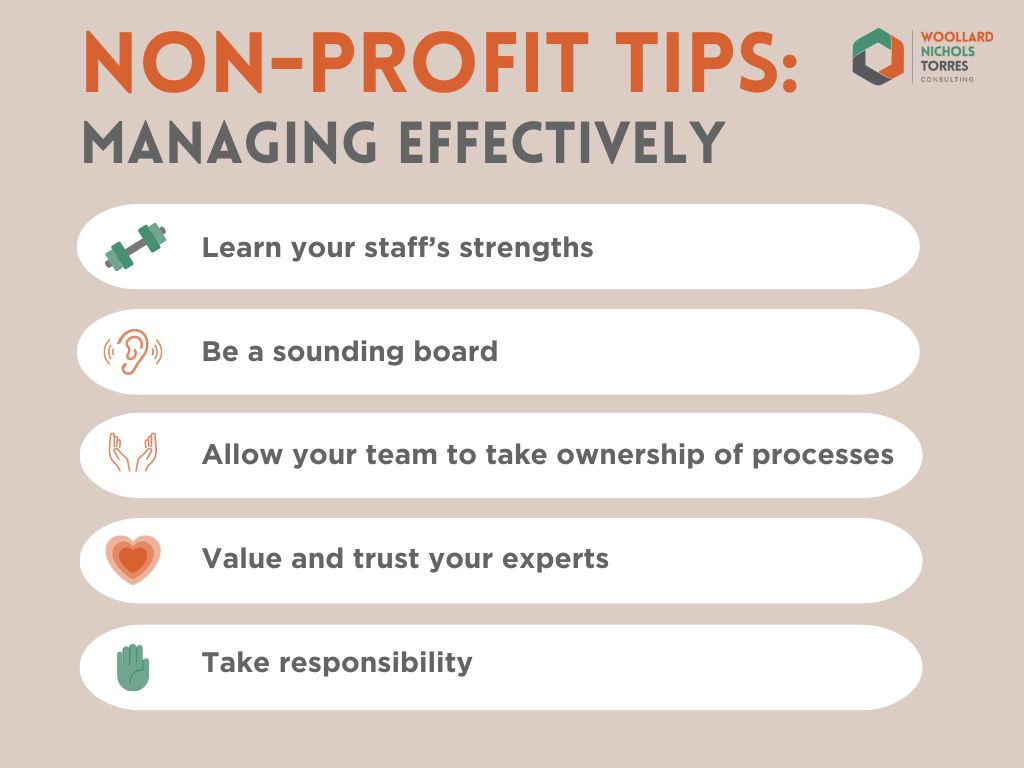By Kelley Abell
Earlier this fall, I sat down with WNT Principal and Managing Partner Andrea Torres to talk about Strengths-Based Coaching. As part of her work with WNT, Andrea offers coaching to social sector and nonprofit executive leaders and managers. Ever ready with a growth mindset, she is passionate about building skill sets to help people succeed in their professional roles. Below you can read about her philosophy, leadership tips for strengths-based hiring and coaching, and learn about common nonprofit leadership challenges and solutions.
Drawing insight from all her roles
Andrea has extensive professional experience in the social sector, in particular in management positions. There are a few key things she’s learned having been a direct report and also having been a manager with direct reports. First, she highlights how important it is for managers to manage expectations: “As an employee/direct report, peer, or manager, I always wanted to know what was expected of me, whether I agreed or not.” Second, she advises against solving problems for your reports – rather, working with them to strengthen their skills. She shares “as a manager, I have loved growing skills and mentoring; not solving problems, but talking through problems with my reports and helping them come to the solution.”
These experiences have led Andrea to her general coaching philosophy now:
- A great coach or mentor helps elicit what you really want to accomplish. “I have questions that can guide you to answer how you want to accomplish what you’ve set out to accomplish. I don’t have the answers for you; I have the questions.”
- Work with the strengths: People won’t utilize an option or solution that goes against their strengths and tendencies.
Andrea’s coaching approach: “I don’t have the answers for you; I have the questions.”
So… What does “strengths-based” mean?
Andrea’s definition in short: “Understanding where people excel – where they give their best work and best thinking – and trying to organize their work around those situations.”
The goal of strengths-based coaching is to provide support for people to be the best versions of themselves. Andrea helps clients see how they can maximize opportunities for strengths in their roles: for example, how CEOs and EDs might shift other opportunities to those who excel at or enjoy those opportunities. Through this approach, Andrea gives advice and recommendations that reflect and use the strengths of her clients.

Advice on strengths-based hiring and staff development
Strengths-based hiring is key. It’s critical to hire people with the right skills and strengths for their exact job. You can think of it like 3 pillars that help someone be successful in their job: work that gives them energy, work that they are good at, and work that they like to do. From Andrea’s perspective, you have to at least get two out of three. If there’s nothing in their job that gives them energy, that’s going to be a challenge.
Once someone is hired: Developing your staff
Understanding your and staff strengths can help you understand motivations that impact productivity (or staff success in their roles).
- If someone isn’t doing x, you need (a) a relationship and (b) an understanding of why they may be behaving as they are.
- Understanding strengths can help you frame work to staff or to help them compartmentalize.
- Tests like StrengthsFinder can be helpful to build a shared understanding among your leadership and staff of which activities are natural strengths of certain employees, and which activities might take more energy to achieve
Andrea credits two of her most meaningful mentors, Page Graves at the City of Austin Auditor’s Office and Dan Pruett at Meals on Wheels Central Texas, with the following advice to managers:
Tips for Managing Effectively
Learn your staff’s strengths – This is a delicate balance of adjusting to your staff’s strengths, while also ensuring you fit the needs of the organization.
Be a sounding board – It’s important to be an attentive listener and occasionally offer new perspectives; for instance, if someone is seeing black and white, it can help to articulate the gray.
Allow your team to take ownership of processes – “At the City of Austin, internal teams were responsible for hiring, developing the performance evaluation process, career ladders, et cetera.”
Value and trust your experts – Don’t micromanage your staff. Trust them to make decisions.
Take responsibility – If your report makes a misstep, that’s on you; you haven’t trained them properly or communicated sufficiently.

Getting to know you…
Andrea gets to know clients intentionally to best understand how to support them. She mentions that coaching is a bit like “work therapy,” emphasizing the importance of a full-humanity approach, or taking the client’s feelings and communication style seriously.
Some of Andrea’s first coaching questions:
- How did you get to where you are now?
- What do you like most about your job?
- What is most challenging in your job?
This practice is both relational and practical: it can be hard to give options or advice that resonates with someone without acknowledging feelings and ensuring that they feel heard. She shares that she doesn’t give advice that runs counter to someone’s approach and identity, unless it’s absolutely necessary (for example: if a client doesn’t like being direct, but direct communication is necessary to avoid communication breakdowns.)
What are the most common challenges that come up in coaching?
Looking for a quick coaching solution? I asked Andrea to share her remedies for top challenges that come up with her coaching clients.
| Challenge | Remedy |
| Effective communication: “Everyone has a different communication style. When we communicate we need to communicate in a language and way that other people will understand what we are intending. When I say something, I have a picture of what it means. Someone else may have a different picture. We both nod, but we are having different conversations” | Write it out, ask questions, reframe what you’re saying in different words. |
| Need for accountability to their own goals and priorities: “It’s important to bring your actions back to what you’re trying to accomplish in the first place.” | Find mechanisms to stay accountable to your top organizational goals, and measure all decisions against your goals. |
| “Honestly, nonprofit ED-land can be a pretty lonely place.” | It’s always good to have a second for thinking and strategic decision making to bounce ideas off of or to provide a different perspective (Board member, Peer, Mentor, or coach.) |
| Management Coaching Needs: Especially as we ask staff to take on management roles, there are daily, weekly challenges that come up – it can be helpful to have a sounding board. | Focus on creating processes to help your staff shine. When your staff shines, you shine. When staff are seen as valuable, it reflects on you |
Who would be a good candidate for coaching?
- Nonprofit Executive Directors, CEOs, Managers
- Any leader who has a love for the mission or your organization, strong skills, and a desire to grow in other skills in their role
- Someone looking for strategic thinking partner
Andrea also provides the following coaching resources:
- Straightforward or tactical support (i.e. building skill sets, preparing grants)
- Capacity Building and Succession Planning (In particular, Andrea loves working with nonprofits interested in building leaders from within the organization and the nonprofit industry.)
Book recommendations
Andrea recommends Influence without Authority by Allen R. Cohen and David L. Bradford. “We are all in situations where we have to manage up or are working with volunteer boards, etc. Influence is an important skill!”
If you’re interested in learning more about WNT’s coaching offerings, reach out to Andrea Torres at andrea@woollardnicholstorres.com.
